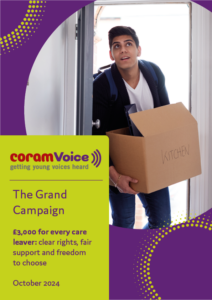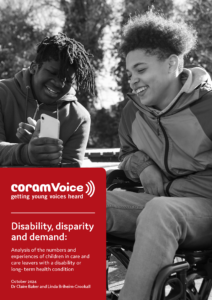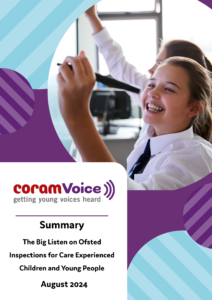02 Mar 23
An analysis of the views and experiences of over 1,200 children and young people in kinship foster care in 38 local authorities is published today in a new report by Coram Voice and The Rees Centre, Department of Education, University of Oxford.
In the first analysis of its kind, The Views of Children and Young People in Kinship Foster Care on Their Well-being finds that on a number of wellbeing indicators, children (4-10 years) and young people (11-18 years) in kinship foster care were doing better or at least as well as those in unrelated foster care and that on some indicators they scored the same or better than their peers in the general population. These findings reinforce existing evidence that kinship care can be a positive experience for children who cannot remain with their birth parents and support current guidance to give preference to suitable placements with family and friends.
Relationships with kinship carers were generally very positive with the majority of children (94%) and young people (91%) reporting that their carers were sensitive to their feelings. One child (aged 8-10) said: “Nanny and Grandad help me with my worries, and they know when I’m sad.”
Nearly all (98%) of the youngest children (4-7 years), 89% of children aged 8-10 years, and 87% of young people aged 11-18 trusted their carers ‘always or most of the time’. More young people in kinship foster care also reported talking frequently to their carers about things that mattered to them compared with those in unrelated care (71% compared to 64%).
There were significantly more children (91%) and young people (87%) in kinship care having contact with at least one of their parents compared with children (87%) and young people (71%) in unrelated foster care, and felt their contact arrangements were ‘just right’. Young people in kinship foster care reported more positively that the things they did in life were worthwhile than those in unrelated foster care (74% compared to 67%). Having a sense of purpose and meaning in life is an important indicator of positive functioning and a protective factor against risky behaviours and poor mental health.
However, there are also a number of well-being indicators on which children and young people in kinship foster care score rated themselves lower than those in unrelated care. There is a common assumption that kinship care is less stigmatising than other forms of substitute care. Yet there was a higher percentage (over a quarter) of kinship children and young people who felt afraid to go to school because of bullying.
Compared to the 5% in unrelated foster care, significantly more of those in kinship foster care (8%) disliked their bedrooms. There were complaints of overcrowding and comments about their carers having financial difficulties. Lack of space may also have been a reason why fewer kinship children (65%) lived with a pet compared with 71% in unrelated foster care.
Relationships with social workers were more complicated. Fewer children in kinship foster care knew their social worker than those in unrelated care (87% compared to 92%). Some of the comments left by young people revealed that they thought the social worker was for their relatives and not for them and some did not know they had a social worker.
It was surprising that only half of those aged 11-18 years were placed directly with their kinship carer. More than a third (35%) had lived in two to four previous placements, and nearly one in ten (9%) had five or more placements before moving in with their kinship carer.
Recommendations
The report is the latest to be published as part of the Bright Spots programme*. Based on the research findings, the authors make eight key recommendations to improve policy and social work practice:
- Ensure that every child knows who their social worker is, how to contact them and that social workers visit regularly and see children on their own.
- Try to ensure that a child’s first placement is their only placement by searching for and assessing relatives or friends as quickly as possible.
- Ensure children and young people have an age-appropriate understanding of why they are living with a kinship carer and support carers around how to talk sensitively to children about their past and the reasons why they are not living with their parents.
- Review contact plans regularly with children and young people and make sure they know where to turn if they are unhappy with how often they are seeing key people in their lives.
- Talk to children about how they feel about their homes and bedrooms and explore creative solutions to make things better if they are unhappy, for example, funding space saving furniture.
- Support kinship carers with income maximisation and ensure they receive all the benefits and allowances they are entitled to.
- Work with the kinship carer(s) and the family network to create a plan for the child’s care in case the kinship carer becomes unable to continue care, reassuring children that adults have planned and will keep them safe.
- Work with schools so that children and staff become more aware of the needs of children in different types of care and consider how they can support children in kinship care with bullying.
Linda Briheim-Crookall, Head of Policy and Practice Development at Coram Voice, said: “These findings show that living with friends and family in kinship foster care can be a positive experience for children and young people who are unable to remain with a birth parent, and also supports current practice to prioritise these placements where possible. However, this analysis also clearly underlines the importance of not treating all children in care as if they are the same. Services need to carefully consider the areas of greater difficulty and complexity for kinship children such as accommodation, financial support, bullying at school and relationships with social workers.”
Julie Selwyn, Professor of Education and Adoption at The Rees Centre at University of Oxford, said: “Most children in kinship foster care are happy and feel that their lives are going well. Yet too many start by having multiple placements. Social workers and agencies need to prioritise locating relatives and friends who are able to care for the child and ensure that there is adequate support to make it happen.”
Download the full report
Download key findings
Go to the Bright Spots Resource Hub page





